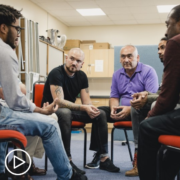How Can Prostate Cancer Collaborative Care Be Coordinated?
How Can Prostate Cancer Collaborative Care Be Coordinated? from Patient Empowerment Network on Vimeo.
How can collaborative care of prostate cancer patients be coordinated? Expert Dr. Ronald Chen discusses typical members of a prostate cancer multidisciplinary team, potential treatment goals, and treatment logistics that are commonly coordinated.
See More from START HERE Prostate Cancer
Related Resources:

How Is Advanced Prostate Cancer Explained to Newly Diagnosed Patients? |

|

START HERE | Collaborative Prostate Cancer Care Resource Guide |
Transcript:
Lisa Hatfield:
Dr. Chen, how do you collaborate with a patient’s medical oncologist or primary care doctor when coordinating treatment options, especially if you have a patient coming in and is being seen by a community center or coming in from a rural area?
Dr. Ronald Chen:
I think cancer care is almost always multidisciplinary. And for a patient to have the best treatment and the best outcome available, and the outcome could be survival, their outcome could be quality of life, for the patient to have the best outcome, having the expertise of multiple different types of oncologists is really, really important.
And that includes a medical oncologist, that includes a radiation oncologist, and also often includes a surgeon, and for prostate cancer, that surgeon’s usually a urologist. And so having a team work together so then each specialist can offer their best treatment available and working together will result in the best outcome for each patient. As a radiation oncologist, I work very closely with my medical oncology colleagues in the care of patients.
Patients with advanced prostate cancer often need radiation to the prostate, radiation to areas of metastasis, radiation to the bone if there’s metastasis to prevent a fracture. So oftentimes, patients will need radiation treatment throughout the course of their treatment. And it’s really important to coordinate between medical oncology and radiation oncology in terms of the sequence of treatment. Does hormone therapy go first? Does radiation go first? Does chemotherapy go first? Does radiopharmaceutical treatment go next?
So being able to work together with a specialist team to coordinate treatment, I think, is really important. And even for patients who live in areas where there may be less resources or less availability of specialists, I think this is still really important. Radiation treatment has evolved a lot in the last 10, 20 years.
And oftentimes, radiation treatment for, let’s say, metastatic disease, it could be as few as one treatment. And so, for patients to be able to hear about that option, hear about potentially as few as one radiation treatment, how that could potentially really impact and help a patient is important, even for patients who live in rural communities, and maybe you have to drive half an hour, an hour, maybe a couple of hours, oftentimes one treatment will still be feasible, especially if it’s an important part of the patient’s care. And so coordination among the specialists is important, and having access to treatment, radiation, I think is also very important to make sure the patient does the best that they can.










